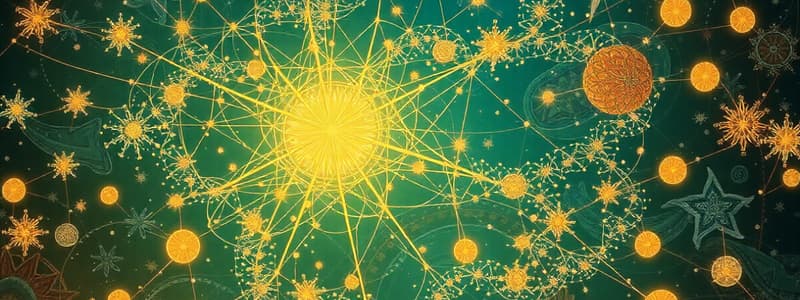Podcast
Questions and Answers
Matter is anything that has weight and takes up space.
Matter is anything that has weight and takes up space.
False (B)
Energy can be created and destroyed according to the law of conservation of energy.
Energy can be created and destroyed according to the law of conservation of energy.
False (B)
Physics includes the study of thermodynamics and electromagnetism.
Physics includes the study of thermodynamics and electromagnetism.
True (A)
Chemistry primarily focuses on celestial objects and phenomena.
Chemistry primarily focuses on celestial objects and phenomena.
The scientific method involves a systematic approach to problem-solving.
The scientific method involves a systematic approach to problem-solving.
Atoms are the fundamental building blocks of matter.
Atoms are the fundamental building blocks of matter.
Astronomy studies only the motion of planets and stars.
Astronomy studies only the motion of planets and stars.
Kinetic energy is energy stored in an object.
Kinetic energy is energy stored in an object.
Flashcards
What is physical science?
What is physical science?
The study of matter and energy, and how they interact. It includes physics, chemistry, and astronomy.
What is matter?
What is matter?
Anything that has mass and takes up space. It is made up of atoms, which are composed of protons, neutrons, and electrons.
What is energy?
What is energy?
The ability to do work or cause change. It comes in various forms, such as kinetic energy (energy of motion) and potential energy (stored energy).
What is physics?
What is physics?
Signup and view all the flashcards
What is chemistry?
What is chemistry?
Signup and view all the flashcards
What is astronomy?
What is astronomy?
Signup and view all the flashcards
What is the scientific method?
What is the scientific method?
Signup and view all the flashcards
Why is measurement important in physical science?
Why is measurement important in physical science?
Signup and view all the flashcards
Study Notes
Introduction to Physical Science
- Physical science is the study of matter and energy, and how they interact.
- It encompasses physics, chemistry, and astronomy.
- It aims to understand the basic principles that govern the universe.
- It uses the scientific method to explore the natural world.
Matter
- Matter is anything that has mass and takes up space.
- Fundamental building blocks of matter are atoms.
- Atoms are composed of protons, neutrons, and electrons.
- Different arrangements of atoms create different compounds and molecules.
- Matter exists in different states: solid, liquid, and gas.
Energy
- Energy is the capacity to do work or cause change.
- Forms of energy include kinetic energy (energy of motion), potential energy (stored energy), and thermal energy (heat).
- Energy can be transferred from one object to another.
- Energy cannot be created or destroyed, only transformed (law of conservation of energy).
Physics
- Physics studies the fundamental laws of motion, force, energy, and matter.
- It includes mechanics (motion and forces), electromagnetism, thermodynamics, and modern physics.
- Key concepts in physics include Newton's laws of motion, gravity, and the properties of light and sound.
- Classical vs. quantum physics.
Chemistry
- Chemistry studies the composition, structure, properties, and reactions of matter.
- It deals with atoms, molecules, and chemical reactions.
- Key concepts in chemistry include atomic structure, chemical bonding, stoichiometry, and reaction kinetics.
- Types of chemical reactions (acid-base, redox, etc.).
Astronomy
- Astronomy examines celestial objects and phenomena, such as planets, stars, galaxies, and the universe as a whole.
- It studies the origin, evolution, and characteristics of these objects.
- Astronomy uses observational tools like telescopes.
- Topics include cosmology, planetary science, and stellar evolution.
Measurement
- Important for experiments in physical science.
- Measurements use units and standard systems (SI units).
- Accuracy and precision are crucial in scientific measurements.
Scientific Method
- A systematic approach to solving problems and acquiring knowledge.
- Steps include observation, hypothesis formation, experimentation, data analysis, and conclusion.
- Hypothesis should be testable and falsifiable.
- Repeatable experiments and peer review are essential parts of the process.
Laws and Theories
- Physical science relies on natural laws (fundamental principles) and scientific theories (well-supported explanations).
- Examples include Newton's Law of Universal Gravitation and the Theory of Relativity.
- Law is a concise statement summarizing the observed behavior of nature.
- Theory explains how a natural phenomenon works.
Physical Science Applications
- Wide range of applications, influencing engineering, technology, medicine, and more.
- Knowledge of these principles leads to innovations and improvements.
- Examples include advancements in medical devices, computer technology, and energy production.
Studying That Suits You
Use AI to generate personalized quizzes and flashcards to suit your learning preferences.
Description
This quiz covers the fundamentals of physical science, including the study of matter and energy. Explore the core concepts such as atomic structure, the states of matter, and various forms of energy. Test your knowledge on how these principles interplay in the natural world.




